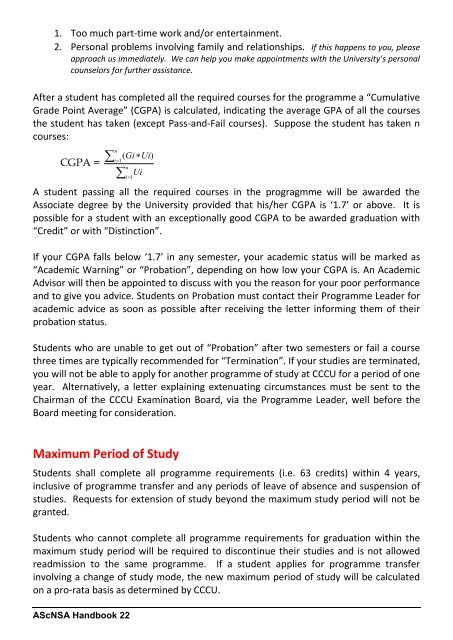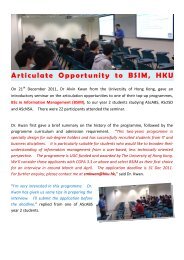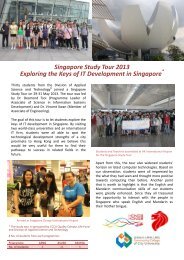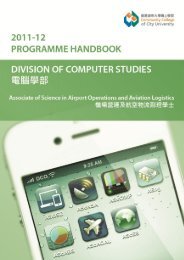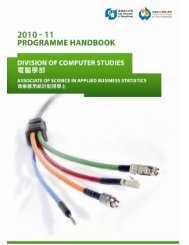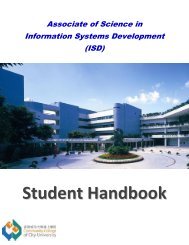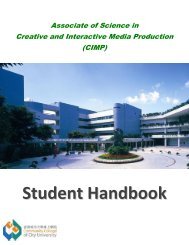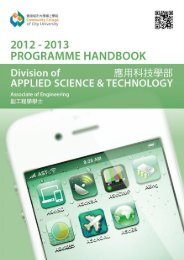AScNSA Handbook 1 - Division of Applied Science and Technology ...
AScNSA Handbook 1 - Division of Applied Science and Technology ...
AScNSA Handbook 1 - Division of Applied Science and Technology ...
Create successful ePaper yourself
Turn your PDF publications into a flip-book with our unique Google optimized e-Paper software.
1. Too much part-time work <strong>and</strong>/or entertainment.<br />
2. Personal problems involving family <strong>and</strong> relationships. If this happens to you, please<br />
approach us immediately. We can help you make appointments with the University’s personal<br />
counselors for further assistance.<br />
After a student has completed all the required courses for the programme a “Cumulative<br />
Grade Point Average” (CGPA) is calculated, indicating the average GPA <strong>of</strong> all the courses<br />
the student has taken (except Pass-<strong>and</strong>-Fail courses). Suppose the student has taken n<br />
courses:<br />
CGPA =<br />
n<br />
� (<br />
i�1<br />
�<br />
i�1<br />
<strong>AScNSA</strong> <strong>H<strong>and</strong>book</strong> 22<br />
Gi�Ui)<br />
n<br />
Ui<br />
A student passing all the required courses in the progragmme will be awarded the<br />
Associate degree by the University provided that his/her CGPA is ‘1.7’ or above. It is<br />
possible for a student with an exceptionally good CGPA to be awarded graduation with<br />
“Credit” or with “Distinction”.<br />
If your CGPA falls below ‘1.7’ in any semester, your academic status will be marked as<br />
“Academic Warning” or “Probation”, depending on how low your CGPA is. An Academic<br />
Advisor will then be appointed to discuss with you the reason for your poor performance<br />
<strong>and</strong> to give you advice. Students on Probation must contact their Programme Leader for<br />
academic advice as soon as possible after receiving the letter informing them <strong>of</strong> their<br />
probation status.<br />
Students who are unable to get out <strong>of</strong> “Probation” after two semesters or fail a course<br />
three times are typically recommended for “Termination”. If your studies are terminated,<br />
you will not be able to apply for another programme <strong>of</strong> study at CCCU for a period <strong>of</strong> one<br />
year. Alternatively, a letter explaining extenuating circumstances must be sent to the<br />
Chairman <strong>of</strong> the CCCU Examination Board, via the Programme Leader, well before the<br />
Board meeting for consideration.<br />
Maximum Period <strong>of</strong> Study<br />
Students shall complete all programme requirements (i.e. 63 credits) within 4 years,<br />
inclusive <strong>of</strong> programme transfer <strong>and</strong> any periods <strong>of</strong> leave <strong>of</strong> absence <strong>and</strong> suspension <strong>of</strong><br />
studies. Requests for extension <strong>of</strong> study beyond the maximum study period will not be<br />
granted.<br />
Students who cannot complete all programme requirements for graduation within the<br />
maximum study period will be required to discontinue their studies <strong>and</strong> is not allowed<br />
readmission to the same programme. If a student applies for programme transfer<br />
involving a change <strong>of</strong> study mode, the new maximum period <strong>of</strong> study will be calculated<br />
on a pro-rata basis as determined by CCCU.


